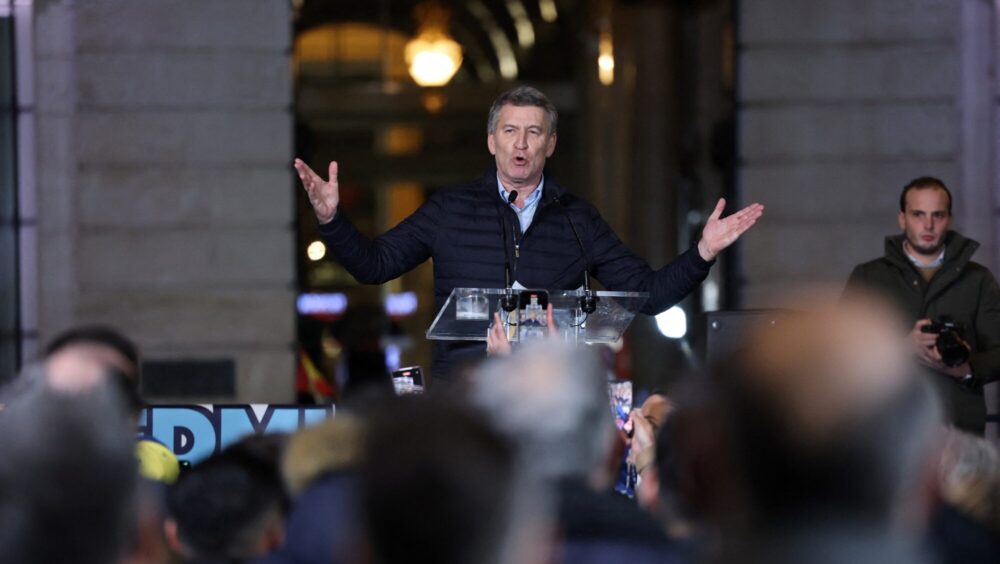
Spain’s opposition party Partido Popular (PP) leader Alberto Nunez Feijoo
Thomas COEX / AFP
Spain’s socialist PM Pedro Sánchez (PSOE/S&D) is facing criticism in Brussels for rule of law violations and mounting corruption scandals. Ursula von der Leyen’s European People’s Party (EPP) has expressed concerns about the “anti-democratic drift” of Spain’s left-wing government, with Alberto Núñez Feijóo, the leader of Partido Popular (PP), the second largest member party in EPP, particularly vocal in condemning Sánchez.
Speaking at the EPP summit in Berlin over the weekend, Feijóo said his colleagues in the group were united in their condemnation of the corruption in Sánchez’s circle. “The entire European People’s Party has expressed its concern about the anti-democratic drift that Sánchez’s government is showing,” he warned.
Feijóo then added that the EPP was “committed to act with the measures necessary to defend” the rule of law in Spain. He implied that these measures would be the same as against Hungary and Poland, which would mean the freezing of tens or even a hundred billion euros worth of EU funds.
“The message is obvious, you don’t play with democracy,” the PP leader said.
Among others, the most worrying incidents include the ‘Koldo’ case, involving former transport minister and Sánchez’s right-hand man José Luis Ábalos who allegedly embezzled up to €30 million worth of EU funds, as well the high-level influence-peddling scandal of the PM’s wife, Begoña Gómez, for whom Sánchez was even caught lying and obstructing justice.
Moreover, the socialist prime minister is also accused of several power grabs in recent years, such as violating the constitution with last year’s controversial amnesty deal with Catalan separatists to ensure his government’s survival, or hijacking the country’s public broadcaster to turn it into a private propaganda tool.
A few months ago, Feijóo even likened Sanchez to the late Spanish dictator Francisco Franco, accusing the PM of “censoring and persecuting” critics and launching “an offensive against judges, journalists, and the media.”
The center-right PP recently joined the national conservative Vox (PfE) in an effort to table a no-confidence motion against Sanchez in the Spanish parliament. However, they would still need further support from at least one of the Catalan separatist parties to succeed which is unlikely at the moment. Although one of those parties, Junts, threatened to join the right-wing initiative, it will likely back down once it gets the desired concessions from Sánchez.
So while the PP is finding it hard to fight the government at home, it is increasingly using the wider European group to place pressure on Sánchez from Brussels. Similar to the dispute over Spain’s commissioner nominee, Teresa Ribera, Feijóo’s recent comments regarding “the entire EPP” being concerned about the rule of law in Spain can be viewed as another international escalation, deepening the wedge between the EU Parliament’s two largest groups decades-long allies, EPP and S&D.
Sánchez’s PSOE is not only the largest member of the social democrat S&D (along with the Italian PD), but its chairman, Iratxe García Pérez also comes from the Spanish delegation. This means that EPP cannot criticize Sánchez without picking a fight with S&D as well. This is despite the fact that the mainstream establishment’s hold on Brussels depends on the alliance between these two.
